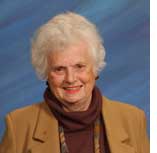|
By Natasha Josefowitz, Ph.D
 LA JOLLA, California—We see this everyday when couples come for lunch or dinner to White Sands, the retirement community where we now live, to explore the possibility of moving here. The scenarios are surprisingly similar. She loves it, is ready to commit. He says he's not sure, he's not ready yet, maybe at a later date.... LA JOLLA, California—We see this everyday when couples come for lunch or dinner to White Sands, the retirement community where we now live, to explore the possibility of moving here. The scenarios are surprisingly similar. She loves it, is ready to commit. He says he's not sure, he's not ready yet, maybe at a later date....
She is looking forward to a future without cooking and cleaning. He of course (I joke) has been in “assisted living” his whole married life. By definition, this is an older couple, belonging to that generation where the men did not help around the house. When he retired, she went right on working as cook, maid, and laundress.
What I say to them is that by the time he feels “ready” it's usually too late--too late to come in as independent and enjoy their retirement years, benefiting from the endless activities and opportunities offered here.
This couple is out of sync as to what each wants and needs. A compromise is usually reached: not just yet, but beginning to plan for a future date.
Then there are the out-of-sync couples who both have careers. Both work, and one of them is offered a new job requiring a move. If it's him, the conventional wisdom has been for the wife to go along. This is changing and the choice usually depends on who has the better job with the most pay or which scenario will give them the most combined income. If it is she who is given a new opportunity elsewhere, many husbands have a difficult time with change or subverting their own goals, and a compromise may be difficult to reach.
In another out-of-sync couple, the woman who has finished raising her children is now ready for a new career. He, in the meantime, has worked all his life and is looking forward to retirement with a life of travel, leisure, and doing things together.
Go to the top of right column
|
|
She may be in the midst of her most productive years—she is finally able to look outward after her stay-at-home years, whereas he is looking inward to home and shared family time. Even if she worked while the kids were at home, she may not have gotten the promotions or taken on bigger jobs because her work time was always sacrificed for the kids be it for doctors’ appointments, school events or illnesses.
With the changes in opportunities available to women over the past half century, this conflict is being experienced in tens of thousands of households.
Carl Jung wrote about this first when he said that with advancing age, men and women reverse roles: men are turning inward and women are turning outward, both being out of sync with each other's needs. Because women are often younger than their husbands and because many started work later in life, the decision to stay in the job market may be an economic one, the accrual of retirement savings and bigger Social Security benefits.
Also, while he may feel burned out and glad to be away from the daily pressures of work, she may be at the crossroads of her greatest opportunities.
He has a legitimate wish to share his retirement years with his life-long companion, while she has an equally legitimate wish to be able to fulfill her professional goals.
Couples must start thinking about these dilemmas before they are upon them. They must be clear about their expectations, their needs, their wishes, and their unfulfilled dreams.
Should he be learning housekeeping skills while she's at work? Should one of them commute, should spending time together only on weekends be enough? Is part-time work the answer, would a consulting job be a possibility?
With the new economic downturn, possibilities and opportunities may be hard to come by—reality may set in with fewer choices. But whatever it is, out-of-sync couples need to reappraise one's life goals and one's past achievements and still find time to accomplish what has been set aside in pursuit of a livelihood. It is no easy task, but maybe the most rewarding time of a couple's life together.
|

